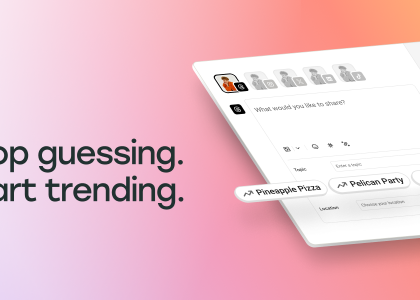Imagine successfully marketing your coaching services across several platforms with so many leads flowing your way that your waiting list is getting out of hand. Then imagine you did it all on a shoestring budget in just a small amount of time each day. 🏆
There’s a lot to do when starting a coaching business, and you don’t want to spend the majority of your time on marketing.
But new marketers often spend so much time promoting their services that they can’t keep up with the workload. As the unfinished projects pile up, the small amount of marketing success they achieve can’t be maintained because there are too many other things to do.
Pro marketers struggle with the same thing, but successful ones have learned a few secrets along the way and know how to market efficiently. In one morning, they can accomplish what it takes a team of people a full week to pull off. This lets them market more consistently and creatively!
In this guide, we share pro marketing secrets and tips that will help you build a successful coaching practice on a budget in a very small amount of time each day.
Be sure to bookmark this guide, which is packed with information that will help drive new clients your way for years to come.
How to create a simple marketing framework
How to write a simple marketing strategy
How to write a simple marketing plan
How to build a simple marketing funnel
Using automation and AI in marketing
10 ways to find new clients for your coaching business
How do coaches find clients?
Coaches tend to find clients through marketing strategies such as word of mouth, email marketing, podcasting, speaking engagements, blogging, networking, and social media marketing.
However, if you’re running a one-person or small business, you can’t do all the marketing things all the time. So, how does a small business market its coaching services efficiently?
To market like a pro in a fraction of the time, use an efficient marketing framework paired with AI-powered tools and automation.
How to create a simple marketing framework for coaches
What if a few hours invested this week could save you hundreds in the future? Developing an efficient marketing framework — before you begin marketing — will improve your overall return on investment (ROI) and save you from costly errors in the future.
As a coach, you can create a marketing framework similar to what professional marketers use but simplified for a small business.
Your 3-step framework will include:
#1 – Write a marketing strategy
A written marketing strategy is an overall plan that guides future decisions on where and how to invest your marketing time.
A marketing strategy helps you:
Position yourself as the best choice for potential clients.
Avoid wasting time on marketing activities that won’t benefit you.
Focus your efforts and attention on areas that drive more clients to your coaching business.
Aim for a super-simple marketing strategy you can develop and write in one morning.
Create your marketing strategy by writing down brief answers to these questions:
1 – Who exactly do you want to reach?
What industry do they work in?
What job titles do they hold?
What pain points drive them to hire a coach?
Where do they congregate online and in person (social media, forums, organizations, etc.)?
2 – What’s your core messaging?
Write a brief but specific answer to each of the following questions:
What mission and values drive your coaching practice?
What differentiates you from other coaches?
How will you position yourself in marketing? For example, will you be a thought leader who provides valuable tips in your content, an entertainer who makes people laugh, a muse who inspires people, or — something else?
What is your personal story?
What are the top benefits of your coaching service?
3 – What are your marketing goals?
To create clear and attainable goals, think S.M.A.R.T.- Specific, Measurable, Achievable, Relevant, and Time-bound.
How many clients would you like to enroll over the next 3 – 6 months?
What other objectives do you want to achieve through marketing?
Congratulations, you just completed a marketing strategy for your business!
Use your strategy as a guideline when making decisions, such as what platforms and content to use, how to write ad copy, and how to fill out bios and profiles across multiple platforms.
#2 – Create a marketing plan for your coaching business
In step one, you created a marketing strategy, which is an overall plan to guide your marketing decisions. A marketing plan is an extension of your marketing strategy. The marketing plan outlines the steps, channels, tools, and content you’ll use to achieve your goals.
TIP: Read through the rest of this guide before writing your marketing plan. You’ll discover tips, ideas, examples, and guidance that may influence your marketing plan.
Create your marketing plan by writing down brief answers to the following questions:
What marketing channels (i.e., social media, email marketing, podcasting, etc.) will you use?
If you’re new to marketing or coaching, we recommend starting with a simple marketing plan you can expand upon over time:
One social media channel, plus
One landing page paired with email marketing automation, plus
One additional channel, if time allows, such as content marketing, speaking engagements, podcasting, etc.
Which software and tools will you use to market your coaching business? We recommend choosing one of each:
Email marketing software
Landing page software
Design tools
AI writing assistant
Social media management software (to schedule your posts in advance)
Referral software
Additional tools for specialized marketing such as podcasting, video or audio productions, etc.
Many of the tools you need are included with AWeber, such as an AI writing assistant, Canva design software, and a landing page tool. Others, such as referral software, can be integrated with AWeber to further automate and enhance your marketing.
What type of content will you publish, and how often will you publish it? On what days and times will you publish?
This is a good time to create a generalized marketing calendar that allows you to visually reference your marketing plans. You can create a more detailed content calendar when you’re ready to begin publishing.
Any other steps for specialized marketing, such as podcasting or speaking engagements.
Congratulations, you’ve written your marketing plan! Next, you’ll build a “marketing funnel” that supports your strategy and plan.
#3 – Create a marketing funnel
The (often forgotten) marketing funnel is the hero of your marketing journey. It’s how you will turn your marketing efforts (readers, subscribers, followers, etc.) into profit.
A solid marketing funnel ensures that your time investment leads to profits and you remain focused on running a successful business. It takes into consideration the five stages of the buyer’s journey: awareness, consideration, conversion, loyalty, and advocacy.
The marketing funnel uses a different type of content at each stage of the buyer’s journey. This helps you guide them along an organic journey to becoming a paid client.
Fortunately, we’ve done the geek work for you. All you need to do is follow the four steps below, and all five marketing funnel stages, with appropriate content for each level, are covered.
Step 1: Create a valuable, helpful ebook, tips list, or other type of lead magnet. Turn it into a PDF that people can download. Step two below will use this as gated content (high-value content that can only be accessed after providing contact or other information).
Step 2: Create a landing page that offers a free download of your ebook or tips list to people who sign up for your email newsletter. The free download is “gated” behind a subscription form (thus the term “gated content”).
Step 3: Send your subscribers a weekly newsletter that educates, inspires, or motivates them with tips relative to your coaching specialty.
Include a strong call-to-action (CTA) at the end of each newsletter that encourages people to schedule a free 15-minute coaching call with you.
Use a calendar scheduling tool that lets people set their own appointments for a free mini-coaching call. Make that free coaching call amazing, and encourage them to sign up for a paid coaching plan at the end of the call.
You can easily create materials for this stage of the funnel with AWeber, which provides you with email marketing automation, built-in Canva features, and an AI writing assistant to help you create stunning landing pages and newsletters in minutes.
Sign up for a free AWeber account today
Step 4: Send your former coaching clients a weekly or monthly email newsletter. Use it to provide valuable tips and guidance relevant to your coaching program graduates.
Use email segmentation to automate newsletter delivery to your alumni.
Include a strong CTA at the end of each newsletter, encouraging people to refer your coaching services to friends, family, or colleagues.
Congratulations, you just built a simple marketing funnel that will help turn your marketing efforts into new clients! As you develop your content, look for software and tools with built-in automation and AI to help you create more efficient and effective marketing campaigns.
Automation and AI-powered tools for coaches
Now that you’ve created an efficient marketing framework, there’s one more element needed to ensure an efficient, effective approach to marketing: Automation.
One of the best things you can do for yourself — and your business – is take advantage of automation and AI-powered tools that help you do your job quicker and more efficiently.
As you decide which marketing tools to use, lean toward tools with built-in automation and AI functions whenever possible.
Automation allows you to set marketing tasks on autopilot so that programs work for you, even when you’re sleeping. AI (such as writing assistants, analytics, and more) can help you make better choices so your efforts are more likely to be successful.
10 Ways to find new clients for your coaching business
Here are ten of the best ways to find new coaching clients, plus tips to get you started in the right direction.
#1 – Word-of-mouth marketing
Ask any coach about the best way to get new clients; most will quickly answer, “Word of mouth!” When clients refer your services to their friends, family, and colleagues, their recommendations carry a lot of weight.
Word-of-mouth marketing earns the type of trust and respect you need to quickly build a long list of clients.
“The most effective client-attracting strategy is talking to as many people as possible and telling everyone what you do. Coaching businesses are built through relationships and conversations!”
– Stacey Brass-Russell, Life & business coach, host of “Passionate & Prosperous” podcast
Make it easy for current and former clients to refer you using an automated referral tool like ReferralKit paired with user-friendly email marketing software.
You can also boost word-of-mouth referrals by getting involved with local community organizations such as the Chamber of Commerce.
#2 – Email marketing and automation
Imagine setting up a series of email newsletters that are automatically delivered to your subscribers at the perfect time – and you don’t need to lift a finger to make it happen!
Email newsletters are a great way to convert potential clients into paying clients, especially when you use them to provide helpful tips and guidance relevant to your coaching business.
You can quickly write a series of valuable emails with help from AI, then schedule it to send automatically on the days and times you choose.
Like a pro marketer, you can also take advantage of email “segmenting.” Segmenting allows you to personalize email content by automatically sending different email series to specific groups of people based on their interests and behavior. To use segmenting in your email marketing, look for user-friendly email software (such as AWeber) that provides personalization and automation features.
For example, a relationship coach might send dating tips to people looking to meet someone or tips on recovering from a breakup to people just getting out of a relationship.
#3 – Social media marketing
Social media is a powerful tool coaches can use to promote their businesses. It’s a great way to connect with potential clients, build relationships, and share your knowledge and expertise.
Source: Instagram @annadkornick, @lewishowes
If you’re new to marketing, start with one social media channel and expand to others only after building one successful, engaged audience.
How do you pick one social media channel for your coaching business?
Choose the social media platform where your target audience (target client from your marketing strategy) is most likely to congregate.
Facebook is great for general audiences, including adults, families, and businesses. It’s also an excellent platform for starting a group or community page.
LinkedIn is a top business platform, ideal for business coaches whose target audience includes executives, managers, and business people. It’s a great choice for business coaches who love to blog (or mini-blog) and network with other business people.
Instagram is a popular platform for young adults and millennials who share content related to their personal (and sometimes professional) lives. It’s a solid choice for coaches wanting to reach an audience that embraces personal self-help and self-care.
YouTube is an excellent platform for reaching almost everyone of any age. People often turn to YouTube for educational video content, making it an ideal platform for coaches wanting to create and publish helpful long-form (5+ minutes or more) video content tutorials.
How to build trust on social media
When making a decision about any product or service, people turn to social media for “social proof.” Social proof is content that validates the benefits of your coaching and establishes trust so people feel comfortable investing in your services.
Providing social proof is equally as important (if not more) as helpful, engaging content.
To provide the type of documentation that makes people feel comfortable hiring you, include the following social proof on your social media profiles/channels and website:
Reviews
Customer testimonials
Awards and recognition
Additionally, consider the following tactics to build trust with your audience:
Respond to comments and questions, negative or positive, quickly and kindly.
Partner with influencers.
Run contests or giveaways that encourage user-generated content.
#4 – Press
While social media has become an important channel for communication, generating press is still a valuable tool for attracting media coverage and promoting your coaching business.
Press releases can be used to announce new information about your coaching business that gets you mentioned or featured in news outlets or other publications. For example, a new product or service launch, a new partnership, or an award are great reasons to send a press release.
Build relationships with journalists by answering questions and volunteering for interviews. A service such as Help A B2B Writer or Help A Reporter Out (HARO) can help you connect with writers and journalists seeking information and quotes in exchange for a link to your site.
#5 – Speaking engagements
Speaking engagements are a fantastic way for coaches to establish themselves as thought leaders and connect with a large number of potential clients.
If you enjoy public speaking and think this would be a good way to market your business, networking with other speakers and event organizers is a great place to start.
Organizations such as the National Speakers Association, Toastmasters International, and TED Masterclass are excellent places to hone your speaking skills and network for future engagements.
Coach Michael Bungay Stanier speaking at TedX on YouTube
#6 – Podcasting
Looking to amp up your reach and establish yourself as a leader in your niche? Podcasting and guest appearances provide an abundance of opportunities for coaches.
The intimate and conversational format of podcasting lets you build a rapport with listeners. It’s an excellent way to build trust and credibility while paving the way for an influx of new clients and partnership opportunities.
Want to learn more about starting your own podcast? Check out Buzzsprout podcasting resources and the Buzzsprout Facebook community, Spotify for podcasters, or LinkedIn Learning’s Podcasting courses.
Insert AWeber YouTube video “Podcasting Tips from Podcast Movement”:
#7 – Influencer marketing
Want to rapidly reach a wider audience, build trust, drive traffic to your site, and generate leads and sales?
Influencer marketing is one of the rare methods that can help you gain instant exposure and quickly build a social media audience (and client list).
Can a solo coach on a budget afford influencer marketing? You bet!
The key to affordable, effective influencer marketing for small businesses? Work with micro-influencers!
Insert AWeber YouTube video “Does Influencer Marketing Work for Small Businesses?”:
Micro-influencers have smaller but highly engaged audiences (10,000 – 100,000 followers). Micro-influencers often partner with businesses in exchange for a trade of services or a small fee.
For example, Carla Jian is an Austin Mom & Wellness influencer with more than 8,500 followers who consistently engage with her content.
She partnered with @monicaandandy pajamas for a promotion that featured an image of her family wearing their pajamas.
You can find influencers by searching online or using an influencer tool like Modashi to conduct filtered influencer searches. Tools like this let you view important details such as their engagement rates, followers, location, and interests.
#8 – Courses, classes, and tutorials
What if you could generate passive income, enhance your coaching skills, build a loyal community, and market your services — all at once?
For coaches, publishing courses on platforms such as Udemy, YouTube, and Skillshare is a gift that keeps giving.
It takes time to put together a valuable, high-quality class, but every course you create has the potential to drive clients and passive income for years to come.
For example, Coaches Natalie and Joeel Rivera offer transformation-based courses on Udemy.
The coaching pair has been creating Udemy courses since 2014 and now has over 700,000 students from more than 200 countries on the platform.
Coaches Joeel & Natalie Rivera’s class on Udemy
#9 – Search engine optimization (SEO)
If you work in person with local clients, local SEO may be a good investment of your time and effort.
However, you may want to skip or limit your SEO marketing efforts if you do not provide local services.
Competitive national or global SEO requires extensive technical and content training. And there’s no guarantee you’ll rank well, even with expert-level knowledge.
Instead, you can use social media to drive traffic to your website and landing pages.
Social media has its own SEO, called social SEO, that you can learn much quicker than Google’s. Each social media platform has different algorithms that determine how many people see your posts. How you optimize content for their native search engines can have a significant impact on how many people see your content.
For example, Instagram has a newsfeed algorithm that’s entirely different from its Reels algorithm. So if Instagram is your primary social channel, it’s worth your time to understand how those algorithms work and what you can do to optimize your profile and posts.
If YouTube is your main social channel, spend an afternoon watching a class like “YouTube SEO SECRETS Course” by Sumner Hobard.
Or browse a wide selection of social media SEO courses to find one that’s right for you.
#10 – Remarketing campaigns
Engaging past clients can provide steady business for coaches, and there are several effective ways to reconnect with your alumni.
Segment your email list based on past interactions, interests, and engagement levels to personalize your outreach. You can customize separate email campaigns to fit specific types of clients. This lets you promote relevant services and exclusive offers.
Offer incentives and rewards such as ebooks, discounts, or complimentary sessions to existing clients who recommend your services to their network.
Introduce new services or add-on packages that cater to evolving client needs. You can offer specialized workshops, group coaching sessions, or personalized mentorship programs to cater to your former clients’ diverse interests and learning styles.
Create and promote books or branded merchandise that provide value to people who have benefitted from your coaching.
Coaches can effectively reconnect with former clients by leveraging email segmentation and referral marketing tools to introduce new services or add-on packages.
Empower your coaching business through marketing
As you move forward with your marketing efforts, remember that the heart of your work lies in empowering people to achieve their goals and reach their full potential. Creating efficient and effective marketing campaigns will allow you to spend more time cultivating growth for you and your clients.
Keep in mind that marketing is not just about acquiring new clients; it’s about nurturing existing relationships and fostering a vibrant community of individuals committed to personal growth.
Engage with your audience as much as possible across all your marketing platforms. Create a sense of belonging and camaraderie that lets your clients know they are part of a larger community. And automate, automate, automate!
Looking for an all-in-one, beginner-friendly platform? AWeber email marketing software provides automation, AI assistance, landing pages, Canva design tools, and segmented email campaigns. Sign up for a free AWeber account today!
The post How to market your coaching business: a guide to increasing clients and sales appeared first on AWeber.






